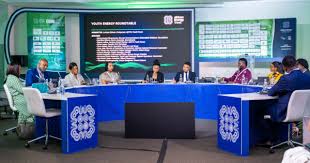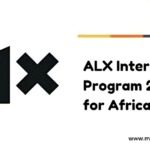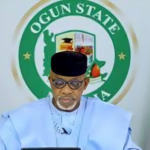With Africa being a dynamic hub for oil, gas, renewable energy, and cutting-edge technologies, youth participation in the sector is essential to introducing fresh perspectives, fostering innovation, and implementing policies that drive inclusive growth. The African Energy Week (AEW): Invest in African Energy 2024 conference, scheduled for November 4-8 in Cape Town, will highlight the role of youth in Africa’s energy landscape through a dedicated Youth Energy Roundtable.
Africa boasts the world’s youngest population, with over 60% under the age of 25. Consequently, the Youth Energy Roundtable aims to develop the next generation of leaders, equipping them with the skills, knowledge, and professional networks necessary to maximize their potential, drive sustainable resource development, and navigate the evolving energy landscape. AEW 2024: Invest in African Energy will host discussions on emerging clean technologies, inclusive energy policies, and the imperative of investing in youth-based programs.
AEW: Invest in African Energy has become the platform of choice for project operators, financiers, technology providers, and government officials, and it has emerged as the official venue for signing deals in the African energy sector. More information about this exciting event can be found at www.AECWeek.com.
With over 600 million Africans lacking access to reliable electricity, there is a strong emphasis on advancing gas-to-power projects and introducing renewable energy and off-grid technologies to rural communities. These sub-sectors offer significant opportunities for young entrepreneurs. Financial support is crucial for enabling youth to actively participate in Africa’s energy sector and contribute to global energy solutions. Education, training, and entrepreneurship opportunities are also essential. The Youth Energy Roundtable will discuss strategies to increase access to capital and foster collaboration among financial institutions and the private sector to support youth-led initiatives.
In line with these efforts, the African Energy Chamber (AEC) – the voice of Africa’s energy sector – is committed to supporting youth development through initiatives like the annual Energy Scholarship Award under its African Energy Education Fund. This program supports young Africans pursuing studies in oil, gas, and energy fields, providing essential financial aid and educational resources. By investing in the next generation of leaders, the AEC is laying the foundation for a skilled workforce capable of driving Africa’s energy future.
Moreover, the African Youths in Energy Network – an organization created to empower young Africans to become energy entrepreneurs – serves as a valuable platform for young professionals to collaborate on sustainable energy projects, access job placement assistance, and participate in educational workshops and professional development opportunities. Programs like Eenovators’ Youth in Energy Empowerment Program in East Africa are also instrumental in equipping young graduates with essential skills through mentorship, training, and practical internships.
Local content policies across the continent further bolster youth participation. South Africa’s Renewable Energy Independent Power Producer Procurement Program mandates substantial local sourcing, stimulating employment opportunities within the clean energy sector. Similarly, Nigeria’s Oil and Gas Industry Content Development Act prioritizes local products, services, and employment, supported by the Nigerian Content Development and Monitoring Board, which forms strategic partnerships with industry stakeholders and educational institutions to improve infrastructure, formulate local content strategies, and promote STEM education initiatives. These initiatives aim not only to alleviate unemployment but also to create a skilled youth workforce.
In Namibia, the Namibia Youth Energy Forum – sponsored and endorsed by the national oil company NAMCOR – aims to empower young Namibians to drive the sustainable energy transition by supporting the creation of a vibrant network of young leaders who drive positive change in the energy industry through education, advocacy, and cooperation. In Mozambique, the Industrial and Commercial Institute of Pemba has trained over 100 young graduates in construction mechanics and hospitality and tourism. Supported by the Mozambique LNG project, the program aims to train 390 young people in essential economic fields, including oil and gas processing, industrial electricity, general mechanics, and hospitality and tourism.
In Senegal, the Support Project for Skills Development and Youth Entrepreneurship in Growth Sectors aims to improve African lives by supporting professional organizations in targeted sectors. The five-year project, funded by the African Development Fund, will assist 250 companies in the hydrocarbon sector, train 2,000 young people, and generate 36,000 jobs. Meanwhile, the Youth-led Climate Change Adaptation and Mitigation for Sustainable Urban Development project in Cameroon aims to reduce wood fuel demand by teaching urban youth to recycle metal waste into energy-efficient stoves, reducing waste and promoting sustainable urban development. Similarly, the Youthinkgreen program in Egypt promotes sustainability and entrepreneurship among youth through educational programs, encouraging hundreds to innovate and create clean solutions in renewable energy, energy management, and water sustainability.
“Our youth are not just the future of Africa’s energy sector – they are its present. Their innovation, enthusiasm, and fresh perspectives can and will drive the transformation we urgently need when it comes to energy access. We must empower and invest in our youth today to ensure a prosperous and sustainable energy future for Africa,” states NJ Ayuk, Executive Chairman of the AEC.
During AEW 2024, the Youth Energy Roundtable will underscore the event’s commitment to harnessing the potential of Africa’s youth. It will serve as a key platform to empower young leaders and shape a sustainable energy future for generations to come.








